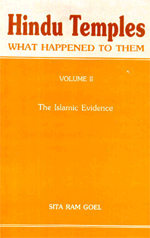|
 Page 1
Page 1
As we shall see, the All„h of the Qur„n says again and again that he is not revealing anything new but only re-affirming what is already recorded in the earlier scripture, namely, the Bible. He is annoyed with the Jews in particular for their refusal to recognize Muhammad as a prophet when their own prophets were known to have spread the same message received from the same source. Muhammad, too, is pained that his people repudiate him without checking with the Jews and the Christians the truth of what he is proclaiming. Muslim theologians of later ages will deny that Muhammad learnt anything from the Bible. In their eagerness to invest Muhammad with an absolutely original inspiration, they will portray him as an illiterate (ummÓ) who could neither read nor write. But we will better believe All„h and his prophet rather than the latter-day Muslim theologians, and proceed to examine what the Bible says vis-a-vis other peoples gods and places of worship.
The Bible is, of course, a large and complex composition spanning several centuries and dealing with diverse subjects. We shall confine ourselves to the main theme which runs through all its book except most of the Psalms and Proverbs, namely, the struggle by a succession of prophets to make the Jews stick to a strict monotheism with all its implications. The prophets speak on behalf of a boastful being who introduces himself as Jehovah and thunders a thousand time that he alone is worthy of worship to the exclusion of all other gods. Moses hails him as a warrior whose name the nations heard and trembled.1
The story in the Bible starts a long time before Jehovah identifies himself to Moses. But that story is not relevant in the present context except at one point where Jacob asked his people to rid yourselves of foreign gods you have among you and buried them under the tere-binth tree.2 For our purpose, the story acquires interest only after Moses leads his people out of Egypt and goes up to Mount Sinai where he has been summoned by Jehovah in a peal of thunder.3 That is when Moses receives the famous Ten Commandments.
Author : Shri Sita Ram Goel
Foot Notes
1 Exod. 15.3,14.
2 Gen. 35.2,4.
3 Exod. 19.19.
|